Building “Green and safe Vietnamese coconut” brand
The coconut tree in Viet Nam is known as a climate-resilient crop, but it faces many challenges in development. Strategy to restructure Viet Nam’s coconut industry towards an ecological, circular, and low-emission model is considered an optimal solution to build the “Green and safe Vietnamese coconut” brand.

Coconut trees facing many challenges
Currently, Viet Nam’s coconut-growing area totals about 202,000 ha, of which 181,000 ha are under harvest, yielding 2.28 million tonnes per year. The Mekong Delta alone accounts for 178,000 ha, producing 1.95 million tonnes per year.
Vinh Long Province — Viet Nam’s “coconut capital” — has more than 120,000 ha, representing over 50% of the national area total. The export turnover of coconut products in 2025 is estimated at around 500 million USD, up 2.9% in comparison with 2024.
However, according to the provincial Department of Agriculture and Environment, coconut production remains fragmented, with each household cultivating only 0.3–0.4 ha on average, and just 30% of farmers engaged in production linkages.
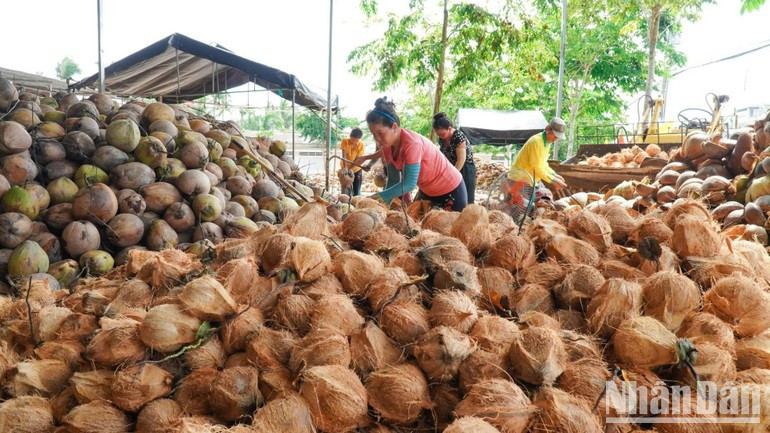
Although the coconut tree adapts relatively well to climate change, productivity and fruit quality have been declining, while pest infestations, particularly from beetles, are increasing. Raw coconut prices fluctuate sharply, sometimes rising suddenly, creating risks for processing enterprises bound by fixed-price export contracts.
Van Huu Hue, Deputy Director of the Vinh Long Department of Agriculture and Environment, noted that the province’s coconut sector has been heavily affected by climate change. Prolonged droughts, freshwater shortages, and rising temperatures have disrupted flowering and fruiting cycles.
The most serious issue is saltwater intrusion, which causes salt stress, reduces nutrient absorption, and lowers yields over consecutive years. It also depletes freshwater sources needed for processing. Meanwhile, during the rainy season, high tides lead to flooding, root rot, and premature fruit drop, weakening coconut trees and degrading soil.
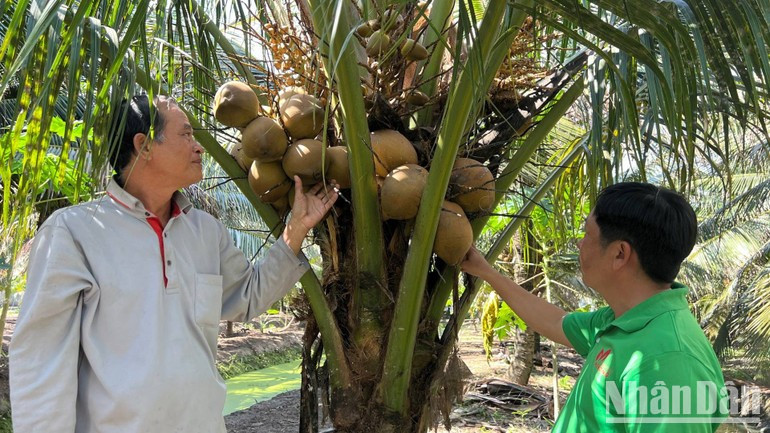
According to Huynh Thi Ngoc Diem, Deputy Director of the Southern Plant Production and Protection Centre under the Ministry of Agriculture and Environment, although the Mekong Delta is the largest coconut-growing region in the country, the quality of material coconut areas remains inconsistent. Cultivation and care techniques are not standardised, and irrigation systems have become outdated.
To improve the quality of the material area, new technologies such as drip irrigation, moisture sensors, and automated watering systems should be applied. High-yield disease-resistant coconut varieties need to be developed. Training programmes for farmers on cultivation and garden management should also be strengthened.
Furthermore, In addition, it is necessary to strengthen production linkages, build cooperatives, and connect with processing enterprises to ensure output; promote sustainable farming, prioritise the use of organic fertilisers and biological agents to replace chemical pesticides, and protect land and water resources; and build brands and promote Mekong Delta coconut products in the international market.
In term of processing, although many businesses have invested in, the Vietnamese coconut industry is still weak in deep processing and preserving fresh coconut for drinking, and the technology is still semi-manual. Meanwhile, major export markets such as the US, EU, and China are increasingly tightening technical and food safety standards, requiring Vietnamese coconut products to meet higher quality standards.
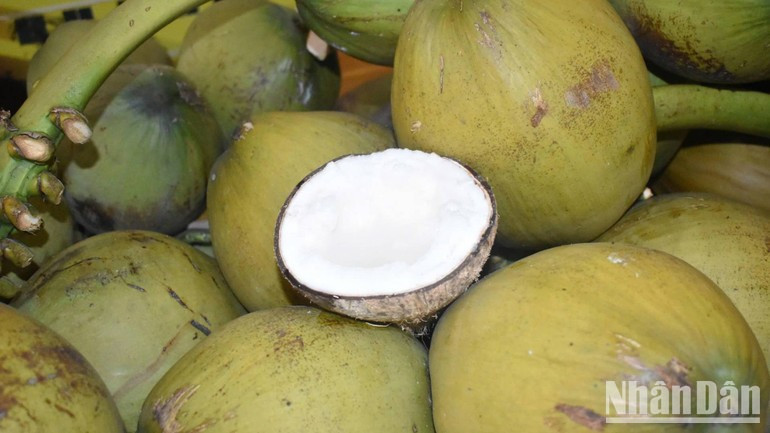
Building “Green and safe Vietnamese coconut” brand
The coconut tree not only provides livelihoods for millions of households but also serves as a strategic material resource for processing industries, exports, and the development of a green economy. However, the Vietnamese coconut sector is facing new challenges, including climate change, pest infestations, poor seed quality, and increasing production standards on production and traceability from international markets.
Nguyen Minh Hoa, Rector of Tra Vinh University, stated that the university considers coconut research, conservation, and development as one of its strategic missions regarding the socio-economic development of the region.
Over the years, the Tra Vinh University has implemented many cooperative projects on breeding, pest control, deep processing, and commercialisation of coconut products. It has also built a project to establish the Mekong Delta Coconut Institute, aiming to become a centre for knowledge, technology, and high-quality human resource training for Viet Nam’s coconut industry; developing training programmes, entrepreneurship, and innovation linked to the coconut value chain, thereby helping students and local communities access knowledge, apply technology, and develop sustainably.
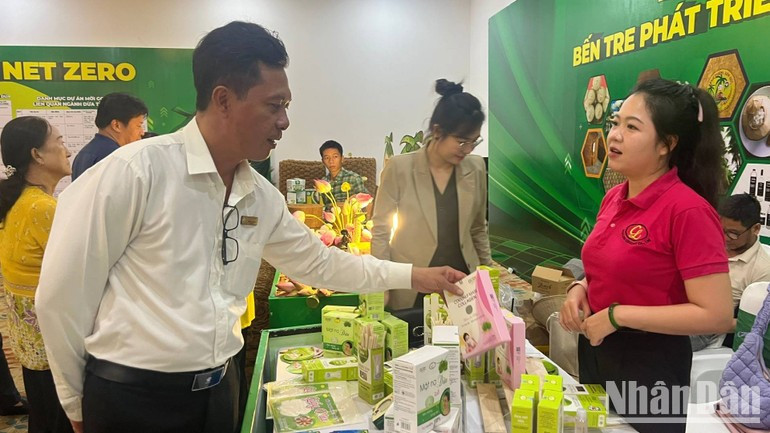
According to the Viet Nam Coconut Association, with more than 200,000 ha, coconut is a perennial industrial crop with the fourth-largest cultivation area in Viet Nam, after rubber, coffee, and cashew. Ten years ago, coconut trees had almost no place on the export map and received little investment. Thanks to the efforts of growers and businesses, the coconut industry has grown strongly.
By 2024, the export revenue of coconuts and coconut-based products had reached nearly 1 billion USD.
In January 2024, the coconut tree was officially included in the National Key Industrial Crop Development Project by the Ministry of Agriculture and Rural Development (now the Ministry of Agriculture and Environment). This marked an important turning point affirming the position of the coconut tree in the agricultural economy.
A wave of coconut-based startups is now thriving, producing innovative products such as coconut nectar and wax coconuts, one of the world’s rarest coconut varieties, contributing to enriching the portfolio of “Made in Viet Nam” products.
Nguyen Thi Kim Thanh, Chairwoman of the Viet Nam Coconut Association, said that building a safe coconut agriculture ecosystem requires close cooperation among four key stakeholders. The state plays a policy-making role, setting standards, providing green credit support, and monitoring agricultural product quality.
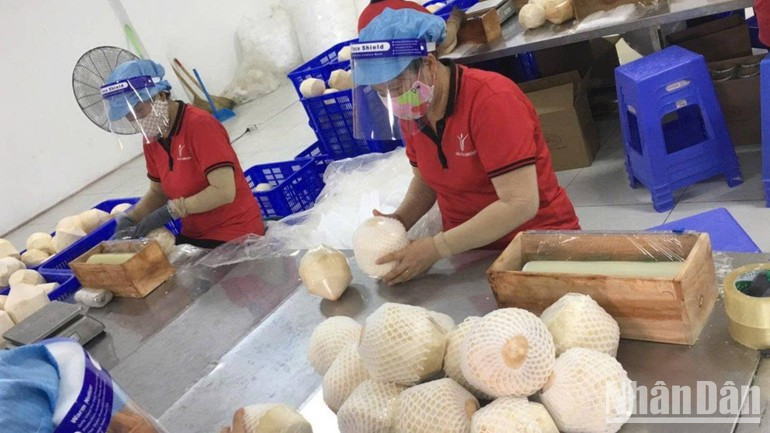
Scientists are responsible for research, technology transfer, developing disease-resistant coconut varieties, and creating ecologically adaptive farming models.
The Viet Nam Coconut Association acts as a strategic bridge, offering policy feedback and promoting the national coconut brand, while enterprises and cooperatives directly organise raw material zones, apply biotechnology, ensure traceability, carry out deep processing, and generate stable jobs for people.
In the long term, this approach will contribute to building the “Green and safe Vietnamese coconut” brand, creating a competitive advantage in international markets. It will also help farmers to move beyond small-scale production towards an ecological, responsible, and globally integrated coconut agriculture, in line with the spirit of the ecological and circular agricultural development strategy.








